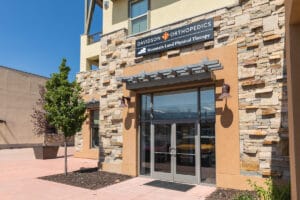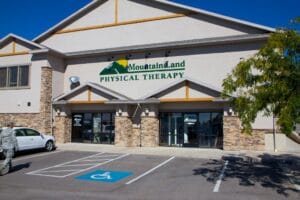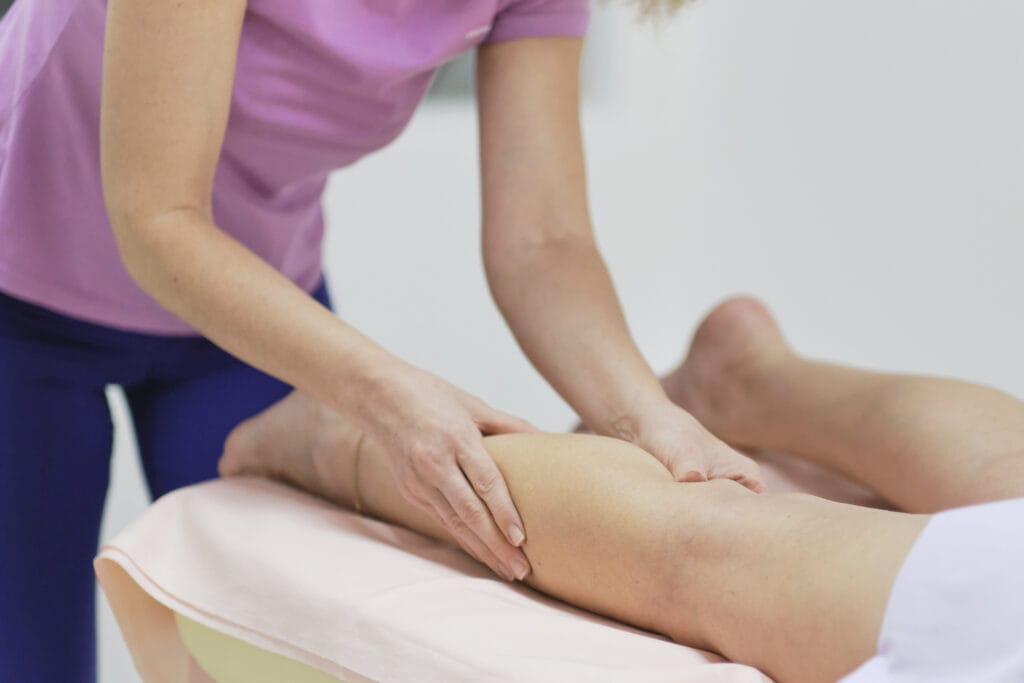The lymphatic system carries infection-fighting white blood cells throughout the body, making it one of the body’s most vital systems. However, lymphedema compromises the body’s ability to circulate and can cause swelling, pain, and increase the risk of infection in the affected limb. With early identification and proper intervention, lymphedema can be controlled and treated.
Mountain Land’s Lymphedema Therapy Program provides effective and compassionate treatment for people affected by lymphedema. Our specialized therapists create an individualized plan that meets the patient’s specific treatment needs, focusing on reducing swelling while restoring confidence and function in daily living.
What is Lymphedema?
Lymphedema is the swelling of an area of the body, typically an arm or leg, resulting from an accumulation of lymph fluid. Lymph, the transparent waste fluid that is collected from body tissues, is normally removed via the lymphatic system.
However, in lymphedema, the body’s ability to circulate lymph is compromised. Instead of the usual transport of lymph fluid from the lymphatic system to the circulatory system, the lymph fluid accumulates and causes swelling, pain, and an increased chance of infection within the affected limb.
Untreated, lymphedema can cause permanent loss of limb function, skin breakdown, chronic infection, and even lymphatic cancer known as lymphangiosarcoma. Although there is no cure for lymphedema, with early identification and proper intervention as outlined above, lymphedema can be treated and controlled, allowing those affected to lead full and normal lives
Symptoms of Lymphedema?
- Swelling
- Sensory changes
- Loss of range of motion in the shoulder or neck
- Decrease in mobility, independence, or upper extremity strength
- Impaired activities of daily living
- Sleep disturbances
What causes Lymphedema?
Lymphedema is caused by a defect or damage within the lymphatic system. There are two types of Lymphedema: primary and secondary. Primary lymphedema is a genetic condition linked to a physical defect in the lymphatic nodes. Physical trauma that overloads the lymphatic system, such as infection, injury, or allergic reactions, can trigger primary lymphedema.
Secondary lymphedema is more common and occurs after a trauma involving the lymph nodes, such as breast, uterine, or prostate cancer, surgery, or cancer treatments. It can appear immediately or long after a medical procedure.
Another very common cause of lymphedema is Chronic Venous Insufficiency or Venous Stasis. The venous system can break down from chronic stress overload. This can cause the valves in the veins to collapse or get blocked while the water starts to accumulate, typically in the legs. The lymphatic system can initially handle the increased load, however, with time and repeated stress, the lymphatic system will give way, resulting in lymphedema.
During the first stages of chronic venous problems, a doctor may prescribe medication to control the problem. Once lymphedema sets in, the effectiveness of medication declines, and a specialized lymphedema therapist should be consulted. Chronic venous problems may present with discoloration, typically a deep reddish-brown stain on the skin. Venous ulcers or wounds are common but usually respond well to treatment.
Lymphedema Treatments
At Mountain Land, we understand that everyone is unique in how they respond to treatment techniques. Our therapists work with patients to create a specialized treatment plan that works best for them. We provide a variety of treatments for lymphedema, including:
- Manual Lymphatic Drainage: Manual lymphatic drainage stimulates lymphatic passages by mild mechanical stretches on the walls of lymph vessels and reroutes lymph fluid around blocked areas.
- Medical Compression Bandaging: medical compression bandaging facilitates lymph flow, prevents refilling of the limb between treatment sessions, and encourages the skin to reshape to a smaller size.
- Therapeutic Exercises: When muscles contract, they exert pressure on the tissue. This then helps pump excess fluid out of the area. Regularly performing the prescribed exercises helps patients play an important part in their own care and self-management.
- Wound Care: Mountain Land’s lymphedema treatment program includes care for various types of wounds. When a fluid imbalance occurs, there is nowhere for fluid to go. Sometimes fluid will drain out of the limb. Lymphatic cysts are clear fluid-like blisters. Sometimes the blister is not visible and fluid simply drains from the limb. Venous wounds are open wounds that have dark purple color around them and are very wet. Arteriole wounds are more grey and yellow around the wound and may not drain as much. All of these types of wounds are addressed in helping patients recover.
- Individualized Exercise Programs: Exercises are prescribed for home performance to enhance lymphatic drainage and also restore flexibility, endurance, and function.
- Patient Education in skin care, hygiene, self-massage, and lifestyle precautions will help maintain the gains achieved in treatment.
At Mountain Land Physical Therapy, lymphedema treatment is provided throughout the full spectrum of care, starting with Home Health services, and progressing to treatment from experienced therapists in our outpatient clinics. A prescribed management program for long-term needs is also offered, with monthly follow-ups with the therapist as needed to monitor the patient’s condition and help keep them current on their compression needs.
Frequently Asked Questions
How will my swelling go down?
Complete Decongestive Therapy has been proven through research to be the most effective way to reduce swelling. This treatment includes a process for manual lymphatic drainage by a special unique massage to help the excess fluid drain out of the swollen limb or area. This therapy treatment also uses exercise to help move this fluid from your swollen tissue as well as some compression-type wraps to prevent the fluid from accumulating in the affected area.
When fluid has accumulated for a long period of time, the unique massage helps to thin out the fluid. The treatment provides a way to help move the excess fluid, via massage and exercise, to get your limbs functioning better. Compression wrapping also has been shown to be effective to prevent this fluid from sitting in your limb. The wraps change the pressure in the affected area to help keep the swelling from coming back.
How long does it take?
You can expect to see improvement after the first session of Complete Decongestive Therapy. Traditionally, a course of 2 – 3 treatment sessions a week, over a period of 2 months. has been shown to provide the best results. Because swelling is often associated with other long-term conditions, you will be taught how to manage this on your own after your course of therapy. It’s advised that you might need to come in periodically for support in helping you manage your condition. Those who follow the course are often amazed at how much better they are able to enjoy so much more in their lives.
What does this treatment cost?
This treatment is generally covered by most insurance. Co-pays and deductibles associated with your health care insurance are applicable. Additional costs may be incurred with the compression wraps, bandages, stockings, or sleeves. Often your health care insurance will help pay for a few of these bandaging wraps each year. Bandaging costs outside of insurance can range from $150.00 to $500.00 for a custom case.
It’s important to check with your insurance to understand your benefits as they apply to this treatment. Because there is so much variation in bandaging costs, it’s important to see a certified lymphedema therapist as they will be best able to show you which bandages are essential for helping you recover.
Will my limb function improve?
Research shows that limb function can definitely improve with this Complete Decongestive Therapy treatment. Lymphatic fluid is very heavy. Once it starts moving out of the affected areas, you will immediately feel improvement. Your tissues become softer and more flexible in the affected areas. This enables you to move more freely and enjoy more use of your limbs to do the things you love to do.
How can this be managed on my own?
During your treatment sessions, your therapist will provide a variety of resources for you to be able to manage this condition on your own. This will include education on how to perform self-massage to promote fluid movement out of the affected area. You will also be shown the proper exercise that pumps fluid out of these problem places. They are called muscle-pumping exercises.
You will also learn prevention/management techniques to minimize fluid accumulation. Skin care management is also an important part of your program to help prevent infections. You will gain a greater base knowledge of how fluid balances in your body to prevent any additional swelling. After a few sessions of therapy, you will feel an increased sense of control over what is going on in your body.
How will this treatment help my wounds?
Research has shown that compression is the best way to help close wounds associated with swelling. It has been seen to be highly effective in getting the proper nutrition and recovery fluids to those parts of your body that aren’t healing. While you may need to have a physician manage you with an antibiotic if there is an infection present, it’s amazing how fast a wound can respond to compression in treatment.





